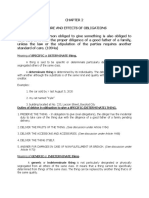Joint and Indivisible Obligations
Joint and Indivisible Obligations
Uploaded by
rai barramedaCopyright:
Available Formats
Joint and Indivisible Obligations
Joint and Indivisible Obligations
Uploaded by
rai barramedaOriginal Description:
Copyright
Available Formats
Share this document
Did you find this document useful?
Is this content inappropriate?
Copyright:
Available Formats
Joint and Indivisible Obligations
Joint and Indivisible Obligations
Uploaded by
rai barramedaCopyright:
Available Formats
Joint and Indivisible Obligation
Art 1210 – indivisibility of an obligation does not give rise to solidarity, neither solidarity will give
rise to indivisibility
o Why? Those 2 concepts refer to 2 diff situations
Solidarity refers to tie (vinculum) that binds the subjects
Indivisibility refers to object or prestation; if prestation is capable of partial
performance, it is divisible; if not capable of partial performance, it is indivisible
Joint- because subjects are plural; Indivisible – because the prestation is incapable of partial
performance
o Example (joint debtor) : A and B – obliged to deliver a specific cow to X
o Example (joint creditor): A obliged to deliver a specific cow to X and Y; law presumes that XY
are joint creditors
o Difficulty: while obligation is joint, each one of the debtors is liable for his share or portion,
not the entire; problem is, the object is incapable of partial performance (you cannot deliver
just the head of the cow)
For obligation to be performed, that requires the collective action of joint debtors
or creditor
Ex. A and B – sold particular car to X – were not able to deliver car on agreed date;
so X sent demand only to A to compel A to make the delivery; will that make A in
delay? No, because demand is not effective; if only addressed to A, he cannot
perform the entire obligation because he is merely joint and liable for his portion of
indebtedness; hence, X will have to address demand to both A and B
EX. A – Obligation to deliver particular car to X and Y; only X made the demand, will
that put A in delay? NO – because X cannot collect the entire credit; he is only
entitled to portion of credit; this will require collective action of XY
In case of insolvency of one; his share is separate and distinct from the others
In case of breach of one of the debtors, what will be the remedy of creditor? A and
B – ready to put out share but C is not; hence, can’t deliver the car. What will be the
remedy of X?
If specific performance, since the obligation is to deliver a determinate
thing the remedy is to compel ABC to make delivery, then creditor will have
to sue all joint debtors
Obligation may be converted into payment of damages (recovery of
damages) – obligation will cease to be joint and indivisible, it will now
become a joint and divisible obligation.
1. Can creditor sue only A or B or C? theoretically, YES, but subject to
Rules of Procedure
2. Damages can only be recovered from erring joint debtor
You might also like
- Class 9 Computer Book Federal Board Merged50% (4)Class 9 Computer Book Federal Board Merged120 pages
- OBC 016 - United Planters Sugar Milling Co., Lnc. v. Court of Appeals - G.R. No. 126890No ratings yetOBC 016 - United Planters Sugar Milling Co., Lnc. v. Court of Appeals - G.R. No. 12689023 pages
- Chapter 3: Different Kinds of Obligations Classification of ObligationsNo ratings yetChapter 3: Different Kinds of Obligations Classification of Obligations21 pages
- Joint and Solidary Liability Mini ReviewerNo ratings yetJoint and Solidary Liability Mini Reviewer4 pages
- Chapter 3 Section 6 Obligations With A Penal Clause PDFNo ratings yetChapter 3 Section 6 Obligations With A Penal Clause PDF1 page
- Morales, Noemi Alodia D. Draw and Outline General ProvisionsNo ratings yetMorales, Noemi Alodia D. Draw and Outline General Provisions3 pages
- C. All Contracts Are Agreements But Not All Agreements Are ContractsNo ratings yetC. All Contracts Are Agreements But Not All Agreements Are Contracts12 pages
- Q: What Is An Obligation?: Obligations INo ratings yetQ: What Is An Obligation?: Obligations I12 pages
- Vgabeto OBLICON-003: Aclc College of TaclobanNo ratings yetVgabeto OBLICON-003: Aclc College of Tacloban11 pages
- Acts, and The Debt Can Be Enforced Only byNo ratings yetActs, and The Debt Can Be Enforced Only by2 pages
- Classification of Obligations According To Sanchez Roman100% (2)Classification of Obligations According To Sanchez Roman2 pages
- Chapter 3 Section 4 Joint and Solidary ObligationsNo ratings yetChapter 3 Section 4 Joint and Solidary Obligations2 pages
- Obligations and Contracts Examination QuestionsNo ratings yetObligations and Contracts Examination Questions19 pages
- Alternative Obligations Arts 1199 1206 1 PDFNo ratings yetAlternative Obligations Arts 1199 1206 1 PDF9 pages
- B. Donor's (Gift) Tax Definition and NatureNo ratings yetB. Donor's (Gift) Tax Definition and Nature12 pages
- Notes For Civil Code Article 1177 and Article 1178No ratings yetNotes For Civil Code Article 1177 and Article 11785 pages
- The Following Must Appear in A Public DocumentNo ratings yetThe Following Must Appear in A Public Document8 pages
- Special Notes and Practical Exercises On Joint and Solidary ObligationsNo ratings yetSpecial Notes and Practical Exercises On Joint and Solidary Obligations7 pages
- General Provisions (Contracts) - ObliconNo ratings yetGeneral Provisions (Contracts) - Oblicon7 pages
- ARTICLE 1797: Distribution of Profits and Losses Among PartnersNo ratings yetARTICLE 1797: Distribution of Profits and Losses Among Partners7 pages
- Oblicon-Joint and Solidary and Extinguishment of ObligationNo ratings yetOblicon-Joint and Solidary and Extinguishment of Obligation5 pages
- Basic Principles Governing The Statute of FraudsNo ratings yetBasic Principles Governing The Statute of Frauds4 pages
- Analysis and Determination of Tourism Climate Index (TCI)No ratings yetAnalysis and Determination of Tourism Climate Index (TCI)7 pages
- 5.1 - Microcontroller and Microprocessor ArchitectureNo ratings yet5.1 - Microcontroller and Microprocessor Architecture35 pages
- PowerHour Understanding ISO 8528 GeneratorSetRatingsNo ratings yetPowerHour Understanding ISO 8528 GeneratorSetRatings37 pages
- Quinto Company Proposal For Heroes Hotel CompressedNo ratings yetQuinto Company Proposal For Heroes Hotel Compressed7 pages
- Mariah Berkers Experienced Administration - Private SectorNo ratings yetMariah Berkers Experienced Administration - Private Sector3 pages
- BSEE's Proposed Production Systems RuleNo ratings yetBSEE's Proposed Production Systems Rule149 pages
- Method Statement For Installation Testing Commissioning of Fire PumpNo ratings yetMethod Statement For Installation Testing Commissioning of Fire Pump11 pages
- Cryptic Allusion Kallistios / Programmer'S Manual: C 2000-2002 Dan PotterNo ratings yetCryptic Allusion Kallistios / Programmer'S Manual: C 2000-2002 Dan Potter45 pages
- Financial Ratio Analysis of Tata Motors LimitedNo ratings yetFinancial Ratio Analysis of Tata Motors Limited20 pages
- Jose Valentin v. David Dinkins, Nyc Police Commissioner, Mario Cuomo, Donovan, Nyc Police Officer, 121 F.3d 72, 2d Cir. (1997)No ratings yetJose Valentin v. David Dinkins, Nyc Police Commissioner, Mario Cuomo, Donovan, Nyc Police Officer, 121 F.3d 72, 2d Cir. (1997)7 pages





























































































